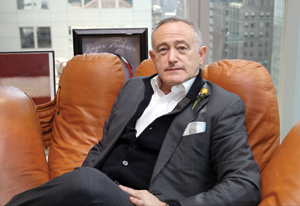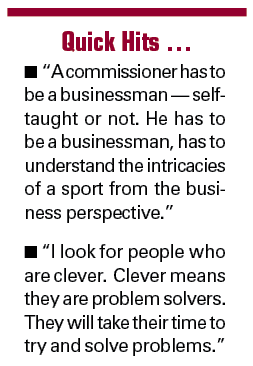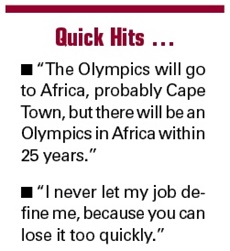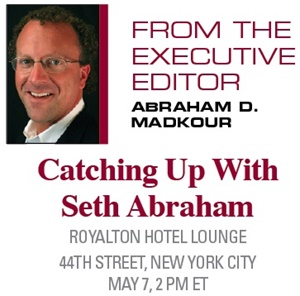“What you will probably learn if you haven’t already is, I’m a storyteller.”
And with more than 40 years in the sports business, Seth Abraham has plenty of good stories to tell.
It had been more than a decade since I saw the longtime HBO Sports and Madison Square Garden executive, but I couldn’t miss him as he sat in a leather chair in the lobby of the Royalton Hotel on 44th Street, where we were scheduled to have dessert. (“I do like sweets. I’m careful, but yes, I do.”) At 65, the man who built HBO’s powerful boxing and sports business over more than 20 years before going to run the Garden is lean, fit and stylish — his suit adorned with a pocket square and matching boutonnière to complete the look. Since he left MSG in 2004, he’s run his own company, Starship SA, which sits cross-cornered from the 42nd Street Library on Fifth Avenue, and he recalled how his former colleagues stressed his need to open an office when he went on his own. “They told me, ‘If you want to be taken seriously, you have to have an office.’ So I have a small office. It was very good counsel.”
 |
Abraham, sitting in his office in midtown Manhattan, looks back at the highs and lows of 40 years in the sports business.
Photo by: PATRICK E. MCCARTHY
|
Over the next few hours, Abraham shared stories on his fondness for sports, leadership and reading. He ordered tea and two desserts and began our conversation with a story brimming with detail.
“I was born around the corner from Ebbets Field,” he said, smiling and leaning back. “My dad started taking me to games when I was 4. It was 1951, and I remember the very first game, when the Dodgers played the Phillies. It was a Saturday afternoon, and we were walking into Ebbets Field on this bright June Saturday afternoon, and I remember seeing the green field, the white uniforms, and the Phillies were in red and gray as the visiting team. It was a 1:10 p.m. game; the gates opened up at 11 a.m. for batting practice, and so we were there at 11, as it’s my first game. And Jackie Robinson is on the field stretching — and I’ve told this to Rachel Robinson a hundred times — and I had never seen a black man that black. He was ebony. And there he is in his white uniform and the royal blue silk warm-up jersey underneath his Dodger jersey. I fell in love with baseball, and to this day, it’s my favorite sport.”
 |
Abraham, who got his professional start working in PR at Hill & Knowlton on Gillette’s baseball business, still consumes the game.
“I watch a lot. I’m a Mets fan,” he sighed. “The general health of baseball is very, very good. I think Bud [Selig] and his staff do a very good job. But here is a theory I have: All sports are cyclical. They rise and fall for a number of reasons, but it isn’t a straight upshot and it isn’t a straight downslide. The appeal of sports in every way — television, attendance, TV ratings and ad dollars — is cyclical, and baseball right now is on the upswing. But at some point, it will slide down a bit as other sports rise up, and that has to do with who the superstars are. If the next Muhammad Ali came along, boxing would go up again. Sports are almost exclusively star-driven.”
 |
In assessing sports leaders, Abraham’s memory cast a wide net, from the late former MLB Commissioner Bowie Kuhn to his take on current leaders. “I worked for Bowie for four years, from 1975-1978, and I liked it very, very much. He was a man of great integrity, great rectitude. His problem, looking back on it today, is that a commissioner has to be a businessman — self-taught or not. He has to be a businessman, has to understand the intricacies of a sport from the business perspective. Bowie was a lawyer, Bowie was a first-rate administrator, but he never grasped the mechanics of baseball’s business, and his reputation suffered because of that. But when it came to administrative decisions, Bowie always made the right decision. Always.”
He then turned to the “two greatest sports business executives of our century:” Pete Rozelle and David Stern. “Both commissioners who turned themselves into business people,” he said. “Both turned their leagues into mega-corporations. Everybody trails them. Both men are terrific consensus builders. Both had a tremendous ability to bring their ownership along with them. Abraham Lincoln once said that he thought as president he should be one foot in front of the public opinion. A yard was too far out and too radical. An inch was not progressive enough. And a foot felt just about right. Rozelle and Stern with their constituencies, the owners, have always been just about a foot in front, and they bring everybody along with them.”
Turning to his career, Abraham recalled that in working for a number of top executives, having their support was a key to any success.
The bosses that stand out to him “were all supportive, understanding and let me make mistakes.” Sipping his tea, he gave one example around his former HBO boss, then-Chairman and CEO Michael Fuchs. “The worst deal I ever made in my life was with the Evander Holyfield/Larry Holmes heavyweight fight in June of 1992,” he recalled. “I made a stupid deal, and I didn’t know it until the night of the fight. In effect, I guaranteed the monies in such a fashion that the promoters, Bob Arum and Dan Duva, didn’t have to hustle and scrape and promote because their money was guaranteed. So on that night, HBO lost about $4 million — and remember, this is 1992. So Michael called me up at home that night, or maybe the next night. It was late. He wasn’t angry, he just said, ‘Just don’t repeat that f---ing mistake again.’ And I never did. I never made a deal like that again. But even though he used the epithet, he wasn’t angry; he didn’t yell at me. He never brought it up again. He made his point. And these are people who have encouraged me. It helps puts things in perspective, like when I worked for Jim Dolan. Jim loved the Garden, teams and Radio City — loves them passionately. But that passion often morphs into zealotry, and that’s difficult to navigate if you work for someone like that, particularly when your boss is the owner. It’s his way and no other way. Tough assignment. I admire, truly, his passion. His zealotry, well, that’s another matter. So you don’t always get what you want; you have to learn to deal with difficult personalities. But I’ve had tremendous bosses who were very instrumental in shaping me as an executive. How you treat people, how to deal with people with integrity — that means a lot to me.”
 |
In assessing talent and hiring people over his career, problem-solving was at the core.
“I look for people who are clever,” he said, scooping a spoonful of apple crust. “I don’t care where they went to school; I look for people who are clever. Clever means they are problem solvers. They will take their time to try and solve problems. They are bright, they are thoughtful, they are smart and tenacious, people who are loyal — loyal to the company, not to me.”
That ability to trust problem-solvers leades to another Abraham anecdote. “In October 1986, I go to Catskill, New York, to see a young fighter that’s causing quite a stir, Mike Tyson. And after watching him in a sparring session, just a sparring session, I knew this was the future of heavyweight boxing. So I and others at HBO drafted an enormous, unprecedented type of deal. Ten fights — this is pre pay-per-view, as pay-per-view hasn’t exploded yet. So 10 fights, $62 million. The problem was, it was October, and I had spent my budget for the year, but the deal I put together was for $62 million. So we people prepared this whole presentation with charts and graphs to present to Michael to ask him for an increase in my allowance to $62 million.
 |
“The day of the meeting, Michael’s secretary calls me and says, ‘Michael can’t make the meeting. He wants to do it by phone.’ I have all these charts, and I said, ‘Let’s reschedule it. It’s not urgent.’ Fifteen minutes later, Michael calls me. He says, ‘Why can’t we do this by phone?’ I said, ‘Michael, we’ve got a presentation to show you; this is a big deal.’ He says, ‘I don’t need a presentation. Just come into my office. I’ll be there at 1 o’clock.’ I tell the other people they’ve been ‘disinvited’ to the meeting, and I go into it with no boards and no videos. I start talking, and he is doing six other things. And I’m sitting there with this $62 million deal, and I said, ‘Michael, if you don’t have the time for this I’ll come back.’ He says, ‘No, no, I got it. OK.’ I said, ‘OK, what?’ He said, ‘OK, you’ve got the money.’ I said, ‘You don’t want to go over this?’ And then he puts down what he was doing and says, ‘Let me explain something to you. You have this job because I assume you’ve thought through all of this. If you didn’t think this was a good deal, it wouldn’t be in my office. If you haven’t thought through this whole thing and you’re in my office, then you’re the wrong guy and I’ll probably fire you by the end of the day. I assumed you’ve thought this through and that’s why you’re in my office.’ He gave me the $62 million, and HBO signed Tyson to a 10-fight deal. That lesson of his confidence in me and his explanation of it has stuck with me about how you deal with people who work with you and for you. Once you have confidence in them, you have to listen, you have to have trust.”
We stay on the topic of boxing, and Abraham is not optimistic. “Boxing today faces the challenge for which there is no answer,” he laments. “Its fan base is, literally, dying. Literally, not figuratively. It’s men in their 60s, 70s and 80s who remember the glory days of boxing. Those men are dying, and the younger generation of fans, mostly young men, are going to mixed martial arts. They find mixed martial arts more exciting, more violent and modern. So as boxing loses its fan base, it’s not replenishing it.”
He then offers predictions in the sports business. “Performance-enhancing drugs will be legal,” he says. “And the athletes can choose to use them or not choose to use them, but I think they’ll be legal. The Olympics will go to Africa, probably Cape Town maybe, but there will be an Olympics in Africa within 25 years.”
As I take notes, Abraham notices that I’m left-handed and recommends the book “The Left-Hander Syndrome,” adding, “It is the history of left-handedness and it’s great.”
We talk about his love of reading, and he says, “I come home every afternoon, put on a pair of jeans and read. And my reading from around 3 p.m. to 6 p.m. is pleasure. I’ve been reading a book about Teddy Roosevelt and the Philippines. I like to read books about great men and women. I read to learn, and if I’m entertained, that’s a bonus.”
I know Abraham has to leave shortly, because after his reading on Tuesdays comes his weekly basketball game on the Upper East Side. And with his lean, 5-foot-10, 170-pound compact figure, it’s obvious that sports plays a role in keeping him sharp. “I play full-court basketball twice a week,” he says. “The Saturday game is at 7:30 in the morning and goes until close to 10. The Tuesday night game runs from 6:45 p.m. to 9:30 p.m. I love it.” And for his position? “I’m a shooter. I’m smart enough to drive once a year, just to let the guys know that I can do it. But I don’t want to get hurt. I enjoy passing. I get more pleasure out of passing than I do out of just shooting.” Tennis is also part of Abraham’s routine. “I play on Fridays with my friend, who is fully retired, and we go out to Billie Jean King National Tennis Center and play two hours of singles.”
Before wrapping up, Abraham turns reflective. “I define myself as a husband, as a father, as a friend, as a guy who loves sports,” he says. “But I never let my job define me, because you can lose it too quickly. You really can lose it very quickly. You start thinking it’s you. You start thinking you’re indispensable. You start thinking a lot of things, all of them bad. The company can’t exist, the Garden is going to fall apart, HBO is going to fall apart. And obviously it’s not true, and you can’t think that way.” He said he’s seen signs over the years when executives become too absorbed in their roles: “The way they treat people.”
Asked what’s next for him and his agency, Starship SA, he’s matter of fact. “I have a deal with my wife,” he said. “I try to succeed with Starship, at worst, being a break-even company, and as long as I can find clients who want to avail themselves of what I want to do — television, arena management, talent relations, broadcasting — I’m happy to have one or two clients. I don’t need to build an IMG. I’m not looking to build a CAA. I just want two or three clients to give me enough to keep me interested and challenged and keep me involved in what’s happening. I work between 12 and 20 hours a week. I have a great client roster. But that’ll come to an end, because the people who hire me are retiring. Their successors won’t know me. My Rolodex is my best asset — who I can get to. But within a short period of time, these men and women will retire, and the men and women who get their jobs will not know me. And I won’t get meetings, and I won’t get calls returned — and that’s OK. That’s the way it is. It’s the way of the world.”
And with that, Abraham walks out of the Royalton, offers a firm handshake and a smile, and heads off to an afternoon of reading followed by Tuesday night hoops.
It’s the way of his world.
Abraham D. Madkour can be reached at amadkour@sportsbusinessjournal.com.








